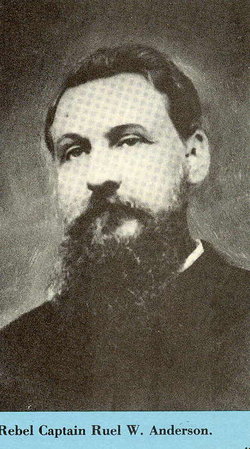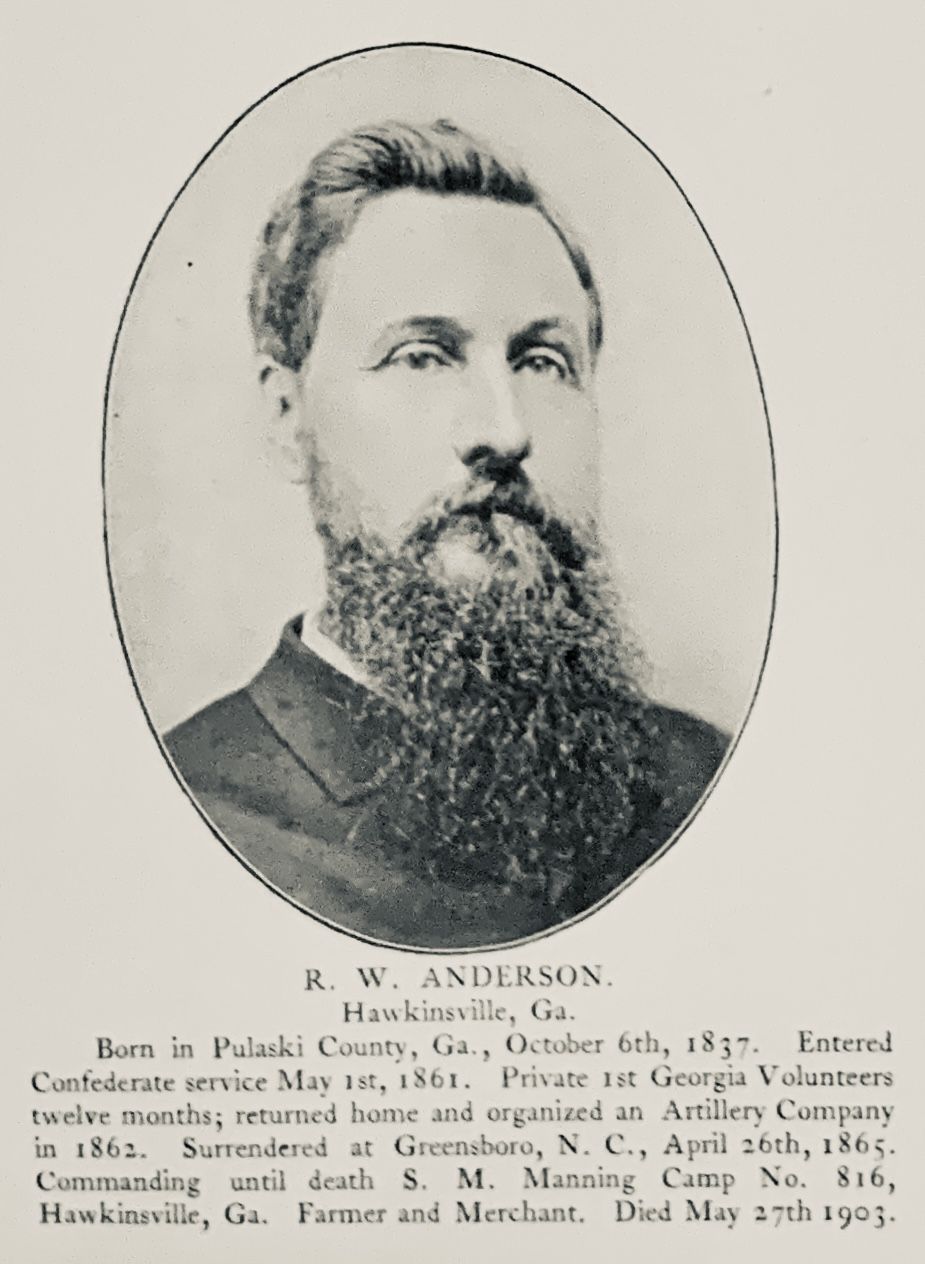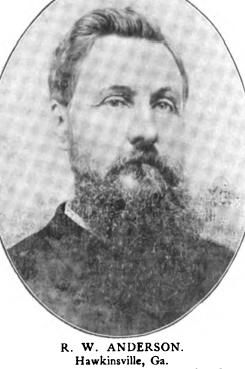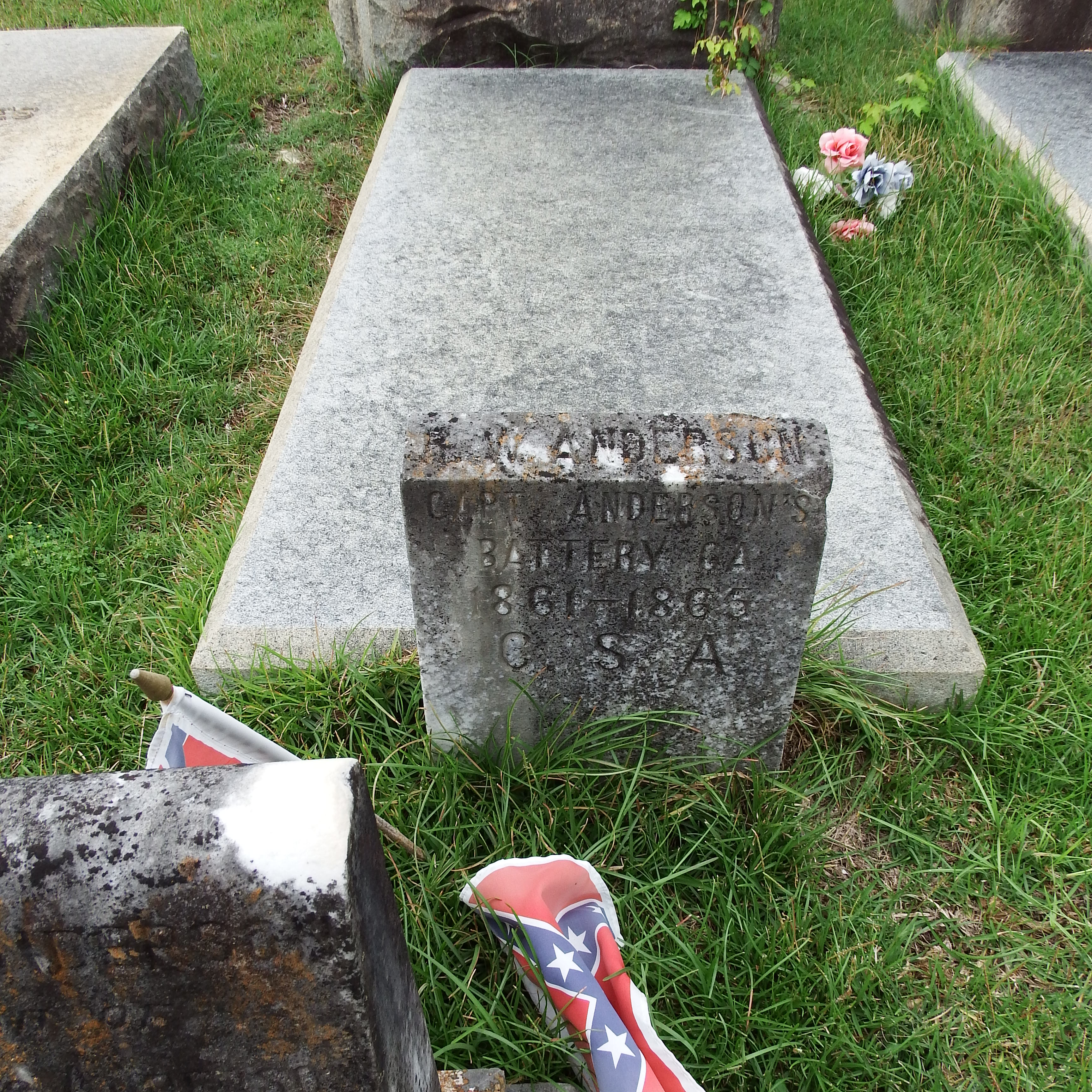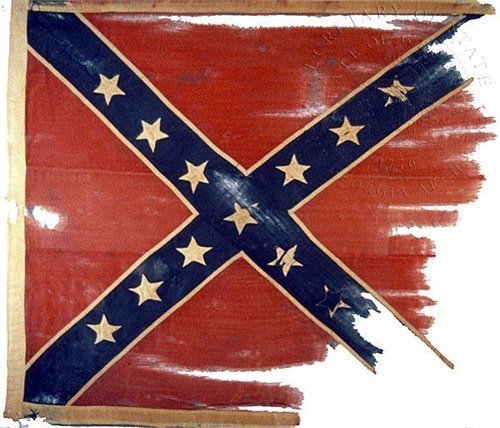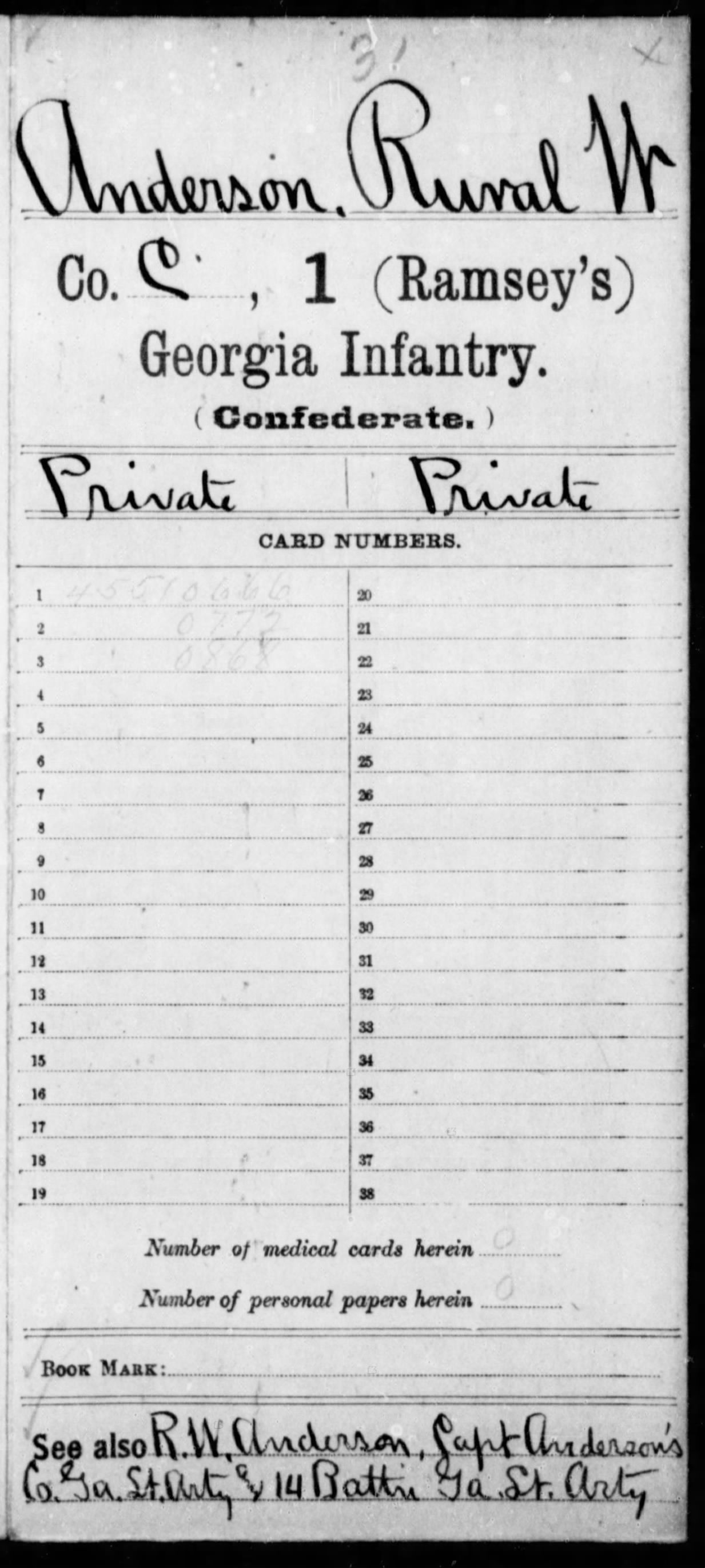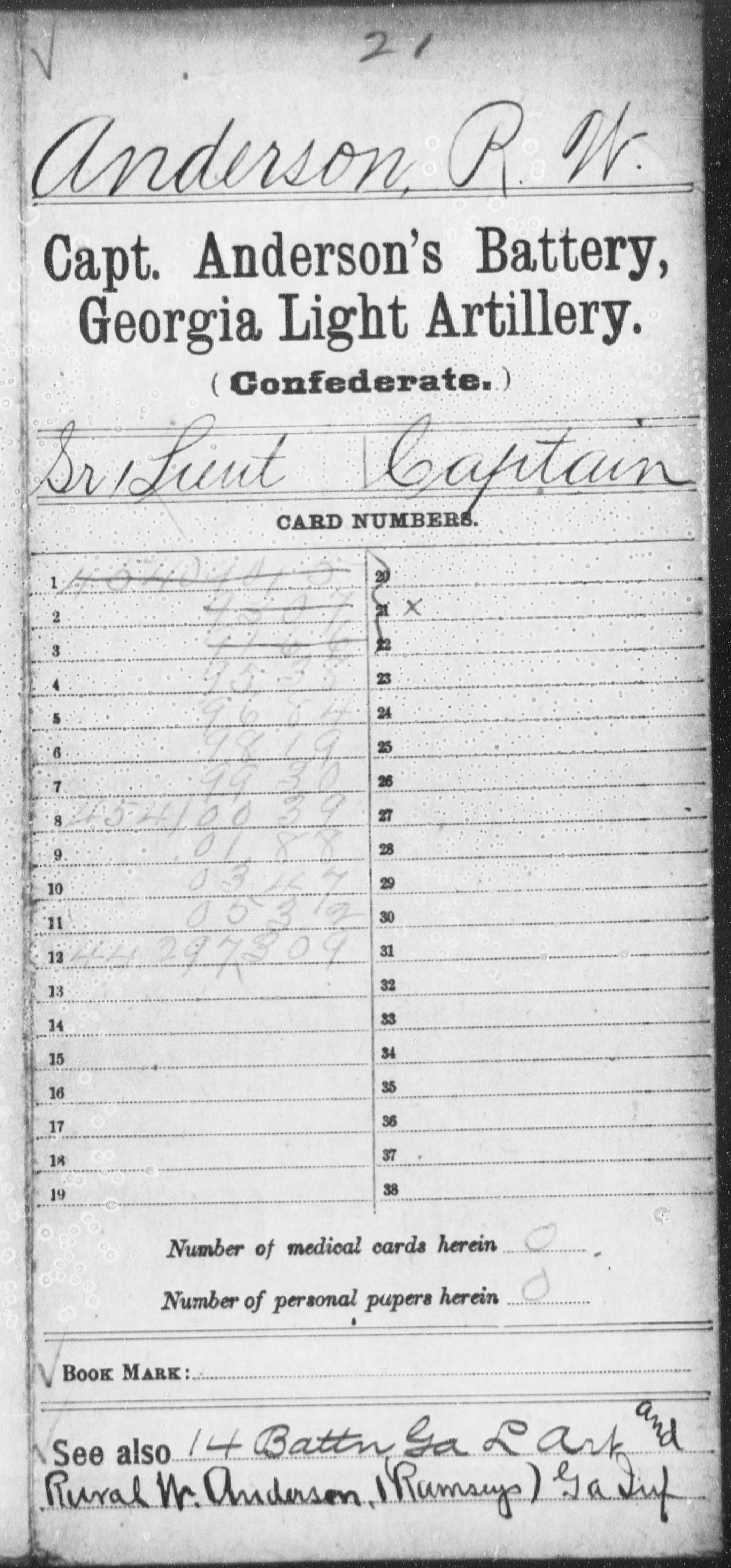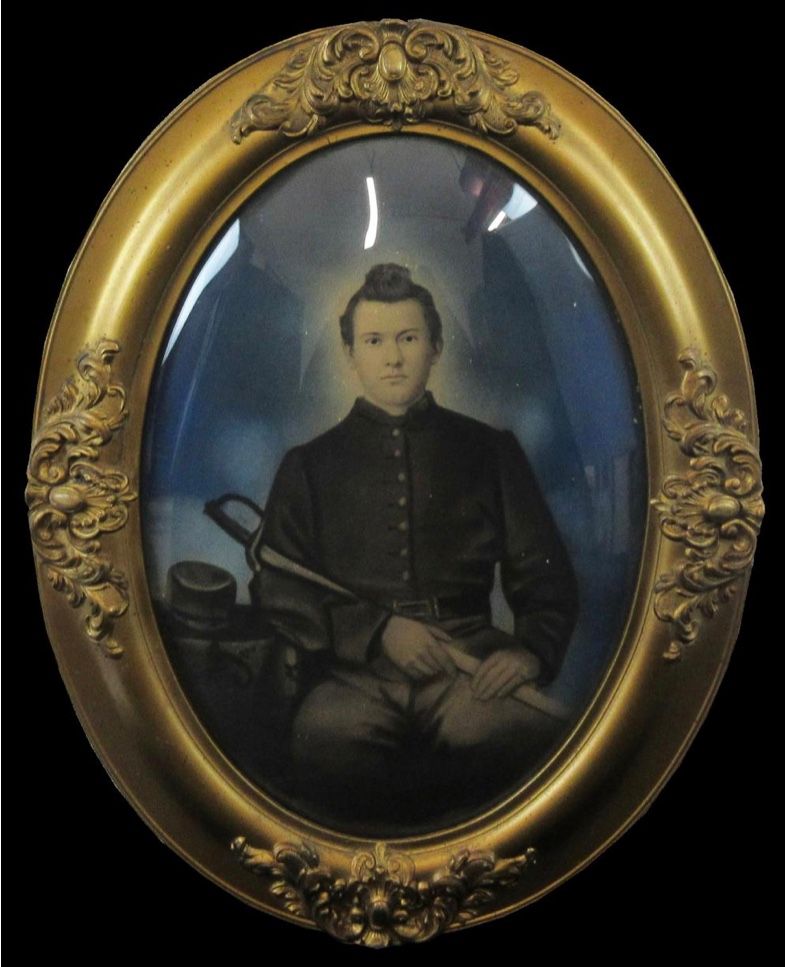Houston County, Georgia
Occupation: Farmer
Enlistment Date: 20 Aug 1861
Rank at enlistment: Private
State Served: Georgia
Survived the War?: Yes
Service Record: Enlisted in Company C, Georgia 1st Infantry Regiment on 20 Aug 1861.
Promoted to Full 1st Lieutenant on 11 Dec 1861.
Promoted to Full Sr. 1st Lieutenant on 26 Apr 1862.
Promoted to Full Captain on 01 Jun 1862.
Mustered out on 18 Mar 1862 at Augusta, GA.
Commissioned an officer in Company A, Georgia Co B 14th Light Artillery Battery on 26 Apr 1862.
Mustered out on 26 Apr 1865 at Greensboro, NC.
Sources: Roster of Confederate Soldiers of Georgia 1861-1865
Confederate Military History
Biography: Captain Ruel W. Anderson, a prominent citizen of Hawkinsville and commander of Manning camp, United Confederate Veterans, is a native of Pulaski county, Ga., where he was reared and educated. He left his occupation as a farmer in July, 1861, in answer to the call of the State, and enlisted as a private in Company C, First regiment Georgia volunteers, commanded by Col. John N. Ramsey.
Joining the regiment at Monterey, Va., after the Laurel Hill retreat, he shared the hardships and battle experience of his command in the mountains of West Virginia. He fought under Henry R. Jackson at Greenbrier river, campaigned under Robert E. Lee at Cheat Mountain, and subsequently was sick at Stanton with typhoid fever. The regiment, after one year's service, returned to Georgia and was mustered out, and then Private Anderson came home and organized a company of artillery, of which Thomas H. Dawson was elected captain and he first lieutenant.
Subsequently, upon the resignation of Dawson, he was promoted to captain, a rank in which he proved himself a skillful and able officer. While in camp of instruction at Griffin his battery was made Company B of the Fourteenth battalion, Georgia artillery, Lieut.-Col. J. T. Montgomery commanding. Afterward they were at Camp Randolph, Calhoun, until October, 1862, when Anderson's battery was sent to Gen. N. B. Forrest by order of Gen. Sam Jones.
Joining Forrest at Murfreesboro, they were subsequently attached to the division of Gen. John C. Breckinridge. In command of his battery Captain Anderson performed important service in a most gallant manner in the six days of battle at Murfreesboro, and was commended in the official report of General Pillow, to whose brigade he was attached, afterward the command of Gen. John C. Brown, of Tennessee.
Subsequently he took part in the Tullahoma campaign and the battles of Chickamauga and Missionary Ridge, and throughout the Atlanta campaign, from Dalton to Jonesboro, served with Palmer's battalion, at first in the reserve artillery and later attached to Hardee's corps. In the operations on the Chattahoochee river he was with Gen. Gustavus W. Smith's command, the Georgia State troops, and on July 22nd, in the battle of Atlanta, he volunteered to advance with Smith's command against the Federal lines, and taking a position within four hundred yards of the enemy, supported by the militia, in ten minutes silenced the Federal fire.
After the fall of Atlanta, Captain Anderson and his battery continued on duty with General Smith and took an active part in the fighting with Sherman's army through Georgia, having two horses shot under him at Griswoldville. They were also on duty in the Carolinas, having their last battle at Bentonville, and surrendered with Johnston's army at Greensboro, N. C.
During this distinguished career Captain Anderson was three times wounded-at the battles of New Hope Church, Chickamauga and Nickajack Ridge-but was seldom absent from his command. His career since the war has been equally distinguished in manly strength and generous public service. After farming for about eighteen years he engaged in the warehouse business at Hawkinsville in 1880, and he also conducts a mercantile business there, and is interested in banking, in addition to managing his extensive agricultural interests.
He was a member of the State constitutional convention in 1877, has represented his county three terms in the Georgia legislature, and is chairman of the board of county commissioners. On February 4, 1864, he was married to Agnes Merritt, who died September 2, 1900, leaving seven sons and three daughters. Captain Anderson is a Baptist, having joined the church in 1854, and has been a consistent member ever since. He was made a deacon in 1866 and is now senior deacon of his church.
Source: Confederate Military History Vol. VII p. 470
Houston County, Georgia
Occupation: Farmer
Enlistment Date: 20 Aug 1861
Rank at enlistment: Private
State Served: Georgia
Survived the War?: Yes
Service Record: Enlisted in Company C, Georgia 1st Infantry Regiment on 20 Aug 1861.
Promoted to Full 1st Lieutenant on 11 Dec 1861.
Promoted to Full Sr. 1st Lieutenant on 26 Apr 1862.
Promoted to Full Captain on 01 Jun 1862.
Mustered out on 18 Mar 1862 at Augusta, GA.
Commissioned an officer in Company A, Georgia Co B 14th Light Artillery Battery on 26 Apr 1862.
Mustered out on 26 Apr 1865 at Greensboro, NC.
Sources: Roster of Confederate Soldiers of Georgia 1861-1865
Confederate Military History
Biography: Captain Ruel W. Anderson, a prominent citizen of Hawkinsville and commander of Manning camp, United Confederate Veterans, is a native of Pulaski county, Ga., where he was reared and educated. He left his occupation as a farmer in July, 1861, in answer to the call of the State, and enlisted as a private in Company C, First regiment Georgia volunteers, commanded by Col. John N. Ramsey.
Joining the regiment at Monterey, Va., after the Laurel Hill retreat, he shared the hardships and battle experience of his command in the mountains of West Virginia. He fought under Henry R. Jackson at Greenbrier river, campaigned under Robert E. Lee at Cheat Mountain, and subsequently was sick at Stanton with typhoid fever. The regiment, after one year's service, returned to Georgia and was mustered out, and then Private Anderson came home and organized a company of artillery, of which Thomas H. Dawson was elected captain and he first lieutenant.
Subsequently, upon the resignation of Dawson, he was promoted to captain, a rank in which he proved himself a skillful and able officer. While in camp of instruction at Griffin his battery was made Company B of the Fourteenth battalion, Georgia artillery, Lieut.-Col. J. T. Montgomery commanding. Afterward they were at Camp Randolph, Calhoun, until October, 1862, when Anderson's battery was sent to Gen. N. B. Forrest by order of Gen. Sam Jones.
Joining Forrest at Murfreesboro, they were subsequently attached to the division of Gen. John C. Breckinridge. In command of his battery Captain Anderson performed important service in a most gallant manner in the six days of battle at Murfreesboro, and was commended in the official report of General Pillow, to whose brigade he was attached, afterward the command of Gen. John C. Brown, of Tennessee.
Subsequently he took part in the Tullahoma campaign and the battles of Chickamauga and Missionary Ridge, and throughout the Atlanta campaign, from Dalton to Jonesboro, served with Palmer's battalion, at first in the reserve artillery and later attached to Hardee's corps. In the operations on the Chattahoochee river he was with Gen. Gustavus W. Smith's command, the Georgia State troops, and on July 22nd, in the battle of Atlanta, he volunteered to advance with Smith's command against the Federal lines, and taking a position within four hundred yards of the enemy, supported by the militia, in ten minutes silenced the Federal fire.
After the fall of Atlanta, Captain Anderson and his battery continued on duty with General Smith and took an active part in the fighting with Sherman's army through Georgia, having two horses shot under him at Griswoldville. They were also on duty in the Carolinas, having their last battle at Bentonville, and surrendered with Johnston's army at Greensboro, N. C.
During this distinguished career Captain Anderson was three times wounded-at the battles of New Hope Church, Chickamauga and Nickajack Ridge-but was seldom absent from his command. His career since the war has been equally distinguished in manly strength and generous public service. After farming for about eighteen years he engaged in the warehouse business at Hawkinsville in 1880, and he also conducts a mercantile business there, and is interested in banking, in addition to managing his extensive agricultural interests.
He was a member of the State constitutional convention in 1877, has represented his county three terms in the Georgia legislature, and is chairman of the board of county commissioners. On February 4, 1864, he was married to Agnes Merritt, who died September 2, 1900, leaving seven sons and three daughters. Captain Anderson is a Baptist, having joined the church in 1854, and has been a consistent member ever since. He was made a deacon in 1866 and is now senior deacon of his church.
Source: Confederate Military History Vol. VII p. 470
Family Members
-
![]()
Adelia T. "Ada" Anderson Brown
1864–1934
-
![]()
Edward Niles Anderson
1867–1925
-
![]()
Sarah Elizabeth "Lizzie" Anderson Shipp
1870–1904
-
![]()
Merritt Anderson
1872–1873
-
![]()
Maria P Anderson
1874–1876
-
![]()
Stiles Robinson Anderson
1878–1927
-
Ruel Augustus Anderson
1880–1958
-
![]()
Frank P Anderson
1882–1922
-
![]()
Dudley Babcock Anderson
1886–1941
-
![]()
Lucy P Anderson Hendley
1886–1947
-
![]()
Frederick Anderson
1888–1889
